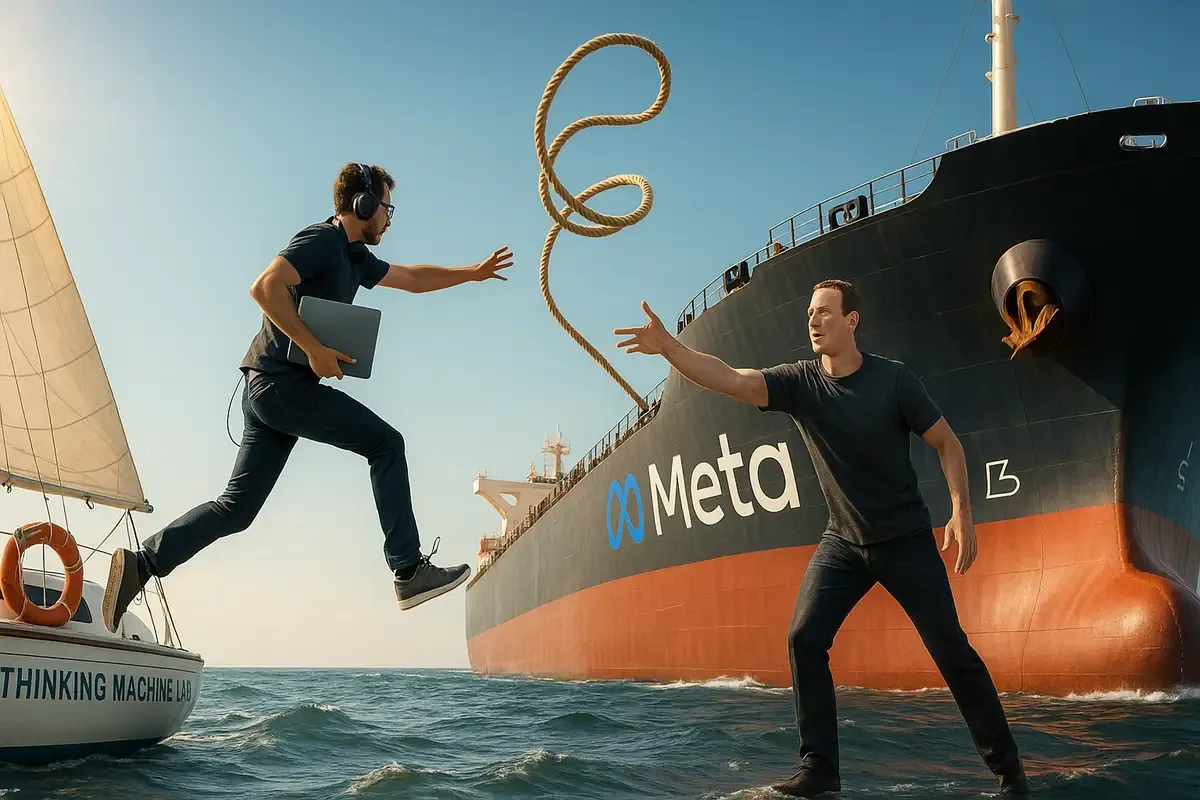The Memory Problem Nobody Solved Until Now
A Spotify engineer built a memory layer for Claude Code that treats your half-finished Obsidian organization as signal, not failure. Now he's racing platform giants to define how AI remembers.
Meta hired Thinking Machines co-founder Andrew Tulloch weeks after the startup raised $2 billion and shipped its first product. The timing reveals a brutal dynamic: even well-funded AI startups can't hold talent against platform-scale compensation packages.

Andrew Tulloch left Friday. The timing says everything.
Thinking Machines Lab co-founder Andrew Tulloch jumped to Meta on Friday, just weeks after the AI startup launched its first product and three months after it closed a $2 billion round at a $12 billion valuation. The move follows the Wall Street Journal’s detailed account of his move, which noted Tulloch had previously turned down a Meta package that the paper said could reach $1.5 billion; Meta dismissed that number as “inaccurate and ridiculous.” Either way, he’s going back.
The departure hits Mira Murati’s roughly eight-month-old company just as it tries to gain traction. Earlier this month, Thinking Machines shipped Tinker, an API for fine-tuning large language models—positioned as researcher-friendly infrastructure rather than another general-purpose chatbot. The money and the milestone didn’t insulate it from Meta’s recruiting machine. Not even close.
The Breakdown
• Andrew Tulloch left Thinking Machines for Meta weeks after the startup raised $2 billion and launched its first product
• Meta hired 50+ AI researchers from rivals using nine-figure packages; individual researcher comp now rivals startup valuations
• The timing reveals retention constraints: well-funded startups can't hold co-founders against platform-scale compensation offers
• Meta's treating talent like infrastructure, spending $66–72 billion on capex while dangling extraordinary comp for proven builders
Meta isn’t buying startups. It’s extracting their co-founders mid-flight. Tulloch spent 11 years at Meta before leaving in 2023 for OpenAI, then co-founded Thinking Machines with Murati in February. Over the summer, Mark Zuckerberg personally courted more than a dozen Thinking Machines staffers. Most stayed. Tulloch just reversed course.
That sequence matters. This isn’t poaching after an exit or a down round. It’s poaching after a product launch and after a record-size raise. Zuckerberg reportedly explored acquiring the company; when that didn’t happen, he pursued individuals. The signal is blunt: in this market, a handful of proven researchers can be worth more to a platform company than an early acquisition—especially when offers include outsized upside if the stock cooperates. That’s the quiet calculus.
Meta is treating top AI talent like core infrastructure. The company now guides to $66–72 billion in 2025 capital expenditures, largely to build and run the data centers that train and serve frontier models. In parallel, it has dangled nine-figure pay in some cases. Zuckerberg himself has been recruiter-in-chief—emailing and texting targets, inviting them to his homes, and selling them on scope and resources. Since summer, Meta has hired more than 50 researchers and engineers from OpenAI, Google DeepMind, Apple, Anthropic, and xAI. The pipeline is the product.
Startups can’t clear that bar indefinitely. You can raise billions and still lose a co-founder if a platform decides one person is worth $100 million-plus in total comp. Thinking Machines has about 30 people, nearly two-thirds from OpenAI. If a single researcher is priced at a meaningful fraction of a startup’s paper value, retention turns into an arms race that venture dollars don’t solve. The constraint isn’t runway. It’s salary ceiling.
From Meta’s vantage, this is infrastructure arbitrage: buy time and execution certainty by hiring the individuals who already know how to ship. From Thinking Machines’ perspective, it’s an execution risk: losing a technical co-founder weeks after launch spooks candidates and complicates roadmaps. And for Tulloch, the trade-off is brutally rational. Even at a fraction of the rumored package, returning to a resource-rich org in a role tied to the company’s highest priority is hard to beat.
Meta restructured its AI efforts into a Superintelligence Labs division and invested roughly $14.3 billion for an estimated 49% stake in Scale AI, bringing Scale’s CEO, Alexandr Wang, inside to lead the push. Under that umbrella sit four teams, including TBD Lab—a small group reportedly working near Zuckerberg’s desk on the next Llama iterations. The company also rolled out an AI video generator with a dedicated tab in its Meta AI app, emphasizing that this is not just a research flex. It’s a roadmap. The story is consistent: centralize talent, feed it compute, ship visible things, repeat.
The framing—“superintelligence”—justifies extraordinary spend on both clusters and people. If you accept the premise, you accept the price. That’s the bet.
This dynamic forces everyone else to choose. Match Meta on comp and burn more on payroll than on research. Or hold the line and risk losing key people mid-project. OpenAI, Anthropic, and now Thinking Machines have all felt variations of this pressure. The bottleneck isn’t bright ideas or even capital. It’s the relatively small population of builders who have shipped at frontier scale and can do it again without training wheels. Hoard those, and you shrink the distance between a lab roadmap and real products.
There’s a second-order effect, too. If Meta can keep its newest hires in centralized labs instead of scattering them across product groups, it keeps learning curves steep and coordination costs low. If it embeds them widely, product velocity jumps but research focus thins out. Where Tulloch lands will be a tell. Watch the org chart, not the press releases.
Three signals to watch next. First, placement: does Tulloch join the TBD Lab or a product-adjacent team? That clarifies whether his brief is core research or applied throughput. Second, retention: do other Thinking Machines engineers follow him in the next 60–90 days, or does the bleed stop here? Third, compensation design: do startups respond with new structures—revenue shares, accelerated liquidity, founder-equity rebalances—to keep senior builders from jumping?
Here’s the harder test. Does $2 billion plus a shipped product confer any retention moat at all? Thinking Machines is not a seed-stage bet. It’s a well-capitalized, ex-OpenAI crew that just delivered v1 of its platform. If that profile can’t hold a co-founder against Meta’s offers, few AI startups can. The talent war isn’t about scooping up fresh PhDs. It’s about peeling off the handful of people who can compress training cycles and debug novel failures at scale. That’s a different market entirely.
Thinking Machines called Tulloch’s contributions “foundational” and said it is “committed to finishing what we started together.” That’s the right tone. The timing—weeks after launch, months after reportedly rejecting Meta’s pitch—tells the rest. In 2025, talent liquidity often overwhelms company loyalty. Meta is proving that the real moat isn’t capital or compute. It’s keeping the people who know how to use both.
Why this matters:
Q: What does Thinking Machines Lab actually build?
A: Thinking Machines launched Tinker in October 2025—an API for fine-tuning large language models. It's positioned as researcher-friendly infrastructure, not another general-purpose chatbot. The company aims to enable more collaborative human-AI interaction. Founded by former OpenAI CTO Mira Murati in February 2025, it has about 30 employees, nearly two-thirds from OpenAI.
Q: How much did Meta offer Andrew Tulloch?
A: The Wall Street Journal reported Meta's package could reach $1.5 billion over at least six years with top bonuses and extraordinary stock performance. Meta called that description "inaccurate and ridiculous," noting any large number depends on stock appreciation. The exact terms of Tulloch's accepted offer weren't disclosed. Meta has offered nine-figure packages to other AI researchers.
Q: Why did Tulloch leave Meta in 2023 if he's going back now?
A: Tulloch left Meta after 11 years to join OpenAI in 2023, then co-founded Thinking Machines with Murati in February 2025. The article doesn't specify why he originally left, but the pattern—Meta to OpenAI to startup to Meta—suggests he was chasing the frontier of AI research and product work before Meta's compensation and superintelligence focus brought him back.
Q: How many AI researchers has Meta hired from competitors?
A: Meta hired more than 50 AI researchers, engineers, and employees from OpenAI, Google DeepMind, Apple, Anthropic, and xAI since summer 2025. CEO Mark Zuckerberg personally recruited them via email and WhatsApp, inviting targets to his homes. Some received compensation packages worth $100 million or more. Meta also tried to acquire Thinking Machines Lab before targeting individual employees.
Q: What is Meta's Superintelligence Labs division?
A: Meta restructured its AI teams into Superintelligence Labs, which houses four teams including TBD Lab—a group near Zuckerberg's desk working on next-generation Llama models. Meta also invested roughly $14.3 billion for an estimated 49% stake in data-labeling startup Scale AI and hired its CEO, Alexandr Wang, to lead the division focused on building what Meta calls superintelligence.


Get the 5-minute Silicon Valley AI briefing, every weekday morning — free.